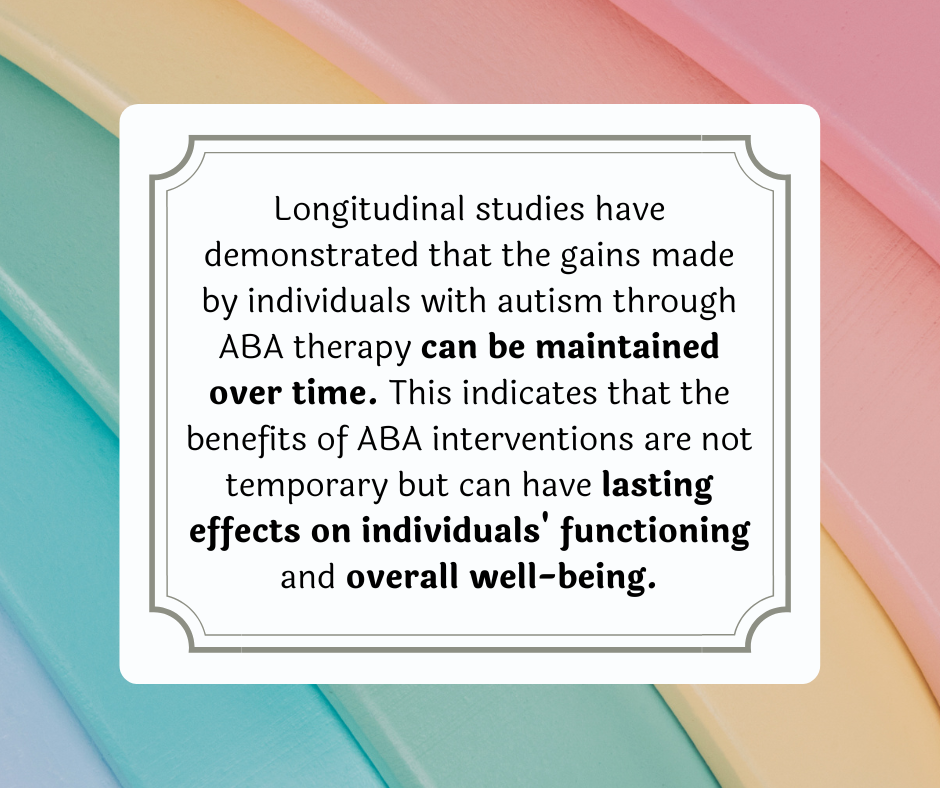Applied Behavior Analysis (ABA) is an evidence-based intervention that has shown significant long-term benefits in enhancing the development of individuals with autism spectrum disorder (ASD). ABA focuses on teaching individuals skills that will benefit them over the long term while also addressing challenging behaviors commonly observed in individuals with autism. By providing an individualized approach, ABA interventions can target the specific needs of each individual, ensuring effective and tailored support.

What is ABA Therapy?
ABA therapy is a systematic and structured approach to intervention that aims to improve socially significant behaviors. It is based on the principles of behavior analysis, which involves analyzing and modifying behavior through the application of scientific techniques. ABA therapy focuses on teaching and reinforcing positive behaviors while reducing or eliminating maladaptive behaviors.
The structure of ABA programs can be tailored to each individual’s unique needs, ensuring that the interventions provided are specifically designed to address the deficits and challenges experienced by individuals with autism. This individualized approach increases the likelihood of long-term benefits resulting from ABA interventions.
How Does ABA Therapy Work?
ABA therapy uses different techniques to modify behavior, promote skill development, and improve the overall quality of life of individuals with autism. These strategies include:

ABA therapy is typically delivered by trained professionals, such as behavior analysts or therapists, who work closely with individuals with autism and their families. The therapy can be implemented in various settings, including homes, schools, and clinics.
By addressing challenging behaviors, teaching new skills, and promoting positive behaviors, ABA therapy aims to improve the overall functioning and quality of life for individuals with autism.
Long-Term Benefits of ABA Therapy
Applied Behavior Analysis (ABA) therapy, an evidence-based intervention for individuals with autism spectrum disorder (ASD), has been shown to have significant long-term benefits. Let’s explore some of the ways ABA therapy can enhance the development of individuals with autism and improve their quality of life.
Enhancing Development in Individuals with Autism
Research has consistently demonstrated that individuals with autism who receive early and intensive ABA interventions experience significant developmental improvements. Through targeted interventions, individuals can make progress in areas such as language development, cognitive skills, self-help skills, and academic abilities.
Progress in Communication, Social Skills, and Adaptive Behavior
ABA therapy has shown notable success in helping individuals with autism improve their communication, social skills, and adaptive behavior. By targeting specific goals, therapists work with individuals to develop effective communication strategies, enhance social interactions, and improve their ability to adapt to various situations. These acquired skills not only foster independence but also enable individuals to engage more effectively with their environment and build meaningful relationships.

Individualized Approach for Long-Term Benefits
One of the strengths of ABA therapy is its individualized approach. Each ABA program is tailored to the unique needs and goals of the individual with autism. By identifying strengths and deficits, therapists can develop personalized interventions that target specific areas of concern. This individualized approach ensures that the therapy is focused on addressing the specific challenges faced by individuals with autism, increasing the likelihood of long-term benefits.
Addressing Challenging Behaviors for Improved Quality of Life
ABA therapy is also effective in addressing challenging behaviors commonly observed in individuals with autism. Maladaptive behaviors, such as self-injury, aggression, or repetitive behaviors, can significantly impact an individual’s quality of life. ABA interventions target these behaviors by identifying their underlying causes and implementing strategies to reduce or replace them with more functional alternatives. By addressing these challenging behaviors, individuals can experience improved emotional well-being and better overall functioning.
Maintenance of Gains Over Time

ABA therapy offers a comprehensive and evidence-based approach to support individuals with autism. By enhancing development, improving communication and social skills, utilizing an individualized approach, addressing challenging behaviors, and maintaining gains over time, ABA therapy provides a solid foundation for individuals with autism to reach their full potential.
Research Supporting the Long-Term Benefits of ABA Therapy
Numerous research studies have provided compelling evidence for the long-term benefits of Applied Behavior Analysis (ABA) therapy in individuals with autism. These studies highlight significant improvements in various areas, including IQ, language, adaptive behavior, problem behavior reduction, and overall quality of life. Here are some key studies that support the efficacy of ABA therapy:
Lovaas (1993) and Sallows and Graupner (2005) Studies: Substantial Gains and Independent Lives
The landmark studies by Lovaas (1993) and Sallows and Graupner (2005) further confirmed the long-term benefits of ABA therapy. These studies followed children who received intensive ABA therapy and found that many of them achieved substantial gains in cognitive abilities, language development, and adaptive behavior. As a result, these individuals were able to lead independent lives and participate fully in society.
Eikeseth (2009) Study: Long-Lasting Effects of Early Intensive Behavioral Intervention
In 2009, Eikeseth conducted a study that specifically focused on the long-term effects of early intensive behavioral intervention (EIBI) based on ABA principles. The findings revealed that children who received EIBI showed significant improvements in cognitive functioning, language skills, and adaptive behavior. The positive effects of the intervention were sustained even after the therapy ended, emphasizing the lasting impact of early intervention.
Linstead et al. (2021) Study: Improved Social Skills, Communication, Adaptive Behavior, and Quality of Life
A recent study by Linstead and colleagues in 2021 further supported the long-term benefits of ABA therapy. The study demonstrated that individuals who received ABA therapy exhibited improvements in social skills, communication abilities, adaptive behavior, and overall quality of life. These findings underscore the comprehensive and individualized approach of ABA therapy in promoting positive outcomes for individuals with autism.
These studies collectively provide robust evidence regarding the effectiveness of ABA therapy and its long-term benefits for individuals with autism. It is important to note that the duration and intensity of therapy may vary depending on individual needs.

The Robustness of Long-Term Benefits
The long-term benefits of ABA therapy for individuals with autism are not only significant but also robust, extending across multiple domains and persisting over time. These benefits demonstrate the effectiveness and lasting impact of ABA interventions in improving the lives of individuals with autism.
Positive Outcomes in Multiple Domains
Research has consistently shown that ABA therapy yields positive outcomes in multiple domains of functioning for individuals with autism. These domains encompass various areas such as communication, social skills, adaptive behavior, and quality of life. ABA interventions aim to enhance these domains by targeting specific behaviors and teaching individuals with autism skills that contribute to their overall development.
Persistence of Benefits at Long-Term Follow-Up Evaluations
Studies have demonstrated that the benefits of ABA therapy persist even beyond the duration of the intervention. For example, research by Eikeseth (2009) revealed that the positive effects of early intensive behavioral intervention were still evident even after 7-8 years following the termination of the intensive intervention. This suggests that the gains made through ABA therapy can have a lasting impact on individuals with autism.
Generalization of Effects to Other Settings and Skills
One of the remarkable aspects of ABA therapy is its ability to produce generalization effects. Research has consistently shown that the skills and behaviors learned through ABA interventions can generalize to other settings and skills that were not directly targeted in treatment. This means that individuals with autism can apply the learned skills in different environments and across various situations, enhancing their overall functioning and independence.
Understanding the long-term benefits of ABA therapy provides a sense of hope and reassurance for parents of individuals with autism. The positive outcomes, persistence of benefits, and generalization effects contribute to improved quality of life and greater independence. While ABA therapy may require commitment and investment, the long-lasting effects make it a valuable intervention for individuals with autism.

Importance of Early and Intensive ABA Therapy
When it comes to ABA therapy, early intervention and intensity play crucial roles in achieving the best outcomes for individuals with autism. Research has consistently shown that early and intensive ABA-based interventions can lead to significant long-term benefits for individuals with autism, regardless of their age, cognitive level, or severity of symptoms.
It is essential to note that the timing of intervention is crucial. The earlier the intervention begins, the greater the potential for positive outcomes. Early and intensive ABA therapy provides individuals with autism the opportunity to acquire essential skills, improve communication, develop social abilities, and enhance adaptive behaviors. By providing this intervention early on, individuals can build a strong foundation for their future development and overall well-being.
Sources:
- https://www.behavior.org/resources/649.pdf
- https://scholarworks.waldenu.edu/cgi/viewcontent.cgi?article=13512&context=dissertations
- https://www.researchgate.net/profile/Jonathan-Tarbox/publication/26816222_Applied_behavior_analytic_interventions_for_children_with_autism_A_description_and_review_of_treatment_research/links/0fcfd4fff0bcab12ab000000/Applied-behavior-analytic-interventions-for-children-with-autism-A-description-and-review-of-treatment-research.pdf

